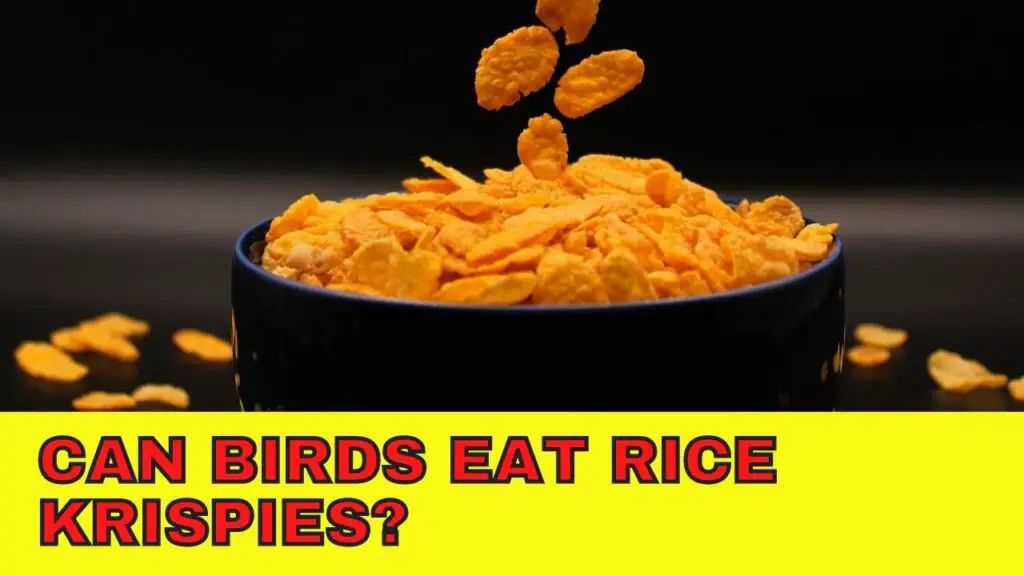If you’re a bird lover, you may be wondering if birds can eat Rice Krispies cereal. The short answer is yes. Despite what the urban myth says, rice will not cause a bird to explode. (More on that later.) In fact, a box of Rice Krispies has around 10 grams of sugar per 100-gram serving, making it a healthier option for your feathered friends than most popular breakfast cereals.
Feeding garden birds cereal such as Rice Krispies is a great way to make sure they get the food they need, especially during winter months and food shortages. Having said that, there are a couple of factors to consider before serving up the Rice Krispies:
- Only serve Rice Krispies in small amounts as an occasional treat to avoid overwhelming the birds’ digestive systems.
- Don’t feed birds cereals with added marshmallows or other sticky, sugary foods.
What Cereal Can You Feed Birds?
The best types of cereal for birds are wholegrain cereals with low sugar content. Birds will benefit greatly from most cereals, as long as they don’t contain high quantities of sugar, chocolate coatings, or bits of marshmallow. Before you reach for the cereal, be sure to check the label. Cereals are often high in sugar (most cereals have an average of 19 grams of sugar per 100-gram serving).
The best kinds of cereal to feed birds are:
- Bran flakes
- Shredded Wheat
- Porridge or oatmeal oats (avoid sugary instant varieties)
- Cheerios
- Corn flakes
- Plain, sugar-free cereals
If the cereal contains dried fruit and nuts, use a rolling pin to crush it up to avoid the risk of choking.
While cereal is a great food source for birds, it’s important to serve it in moderation. Many kinds of cereal are fortified with vitamins specially designed for humans. Birds have different nutritional needs, so while cereal is good in moderation, too much could cause them health issues.
Another reason why you should only offer birds cereal in small amounts is variety in the diet. Birds, like humans, need a balanced diet. Giving birds high quantities of the same foods can cause them to become deficient in other essential vitamins and nutrients. For a truly healthy meal for the birds in your garden, mix small quantities of cereals such as Rice Krispies with other seeds, soft fruits such as cut-up pieces of banana, and mealworm.
Can Birds Eat Crackers?
While okay in very small quantities, it’s not recommended to regularly feed your bird crackers. Foods such as crackers and bread offer very little nutritional value to birds. but they make them feel full very quickly. This can be dangerous for birds who, due to their small size and fast metabolism, need to eat nutrient-rich foods.
Put simply, if birds fill up on empty calories from crackers, they don’t leave room for the foods that contain essential carbohydrates, fats, and proteins.
Crackers can also cause serious health issues in birds because of the high content of salt, sugar, and corn syrup. If you choose to feed birds crackers as an occasional treat, it’s crucial to choose salt-free options.
Can Birds Eat Uncooked Rice?
We’ve all heard the urban myth that uncooked rice can swell inside the stomach of a bird causing it to explode. But is it true?
According to ornithologists, it’s not. The urban myth has stuck around since 1996, but there’s no evidence to support this claim.
Rice needs to be boiled in water at 100 degrees Celsius (212 degrees Fahrenheit) in order for it to cook and swell. The average internal temperature of a bird is around 37 degrees Celsius (98 degrees Fahrenheit), meaning it is nowhere close to the temperature needed to cause the rice to expand inside the bird.
Now we know that uncooked rice won’t cause a bird to explode, but is it good for birds?
Unsalted, cooked, or uncooked rice (brown or white) can give birds essential energy during harsh winter weather. Rice, especially brown rice, contains high amounts of fiber, carbohydrates, minerals, and vitamin B. As birds have such a high metabolism, the rice is quickly converted to energy, meaning it doesn’t stay in the stomach long enough to expand or swell. The time it takes to digest food depends on the size of the bird and the type of food. The smaller the bird, the faster the digestion.
Another common misconception is that uncooked rice can cause choking in smaller seedlings. Birds have incredibly powerful crop muscles and gizzards, allowing them to grind up food as they eat. Birds with smaller beaks, such as finches, break the grains of rice down into smaller pieces that they can digest easily. When feeding their young, birds will break the rice down into smaller pieces to avoid choking hazards.
Key Takeaway
The bottom line is that both cooked and uncooked rice is a safe snack for birds provided that it’s:
- Fresh
- Not fried or seasoned
- Unsalted
- Given in small portions
Food products that contain rice, such as Rice Krispies and rice crackers, are also safe options to serve your birds as long as they don’t contain harmful additives sugar, marshmallows, salt, or oil. It’s best to avoid feeding birds foods that contain high levels of sodium such as crackers. However, very small amounts of salt-free crackers as an occasional treat won’t harm the bird.
